年11月浙江英语高考卷真题及答案
2011年高考英语(浙江卷)真题及答案解析
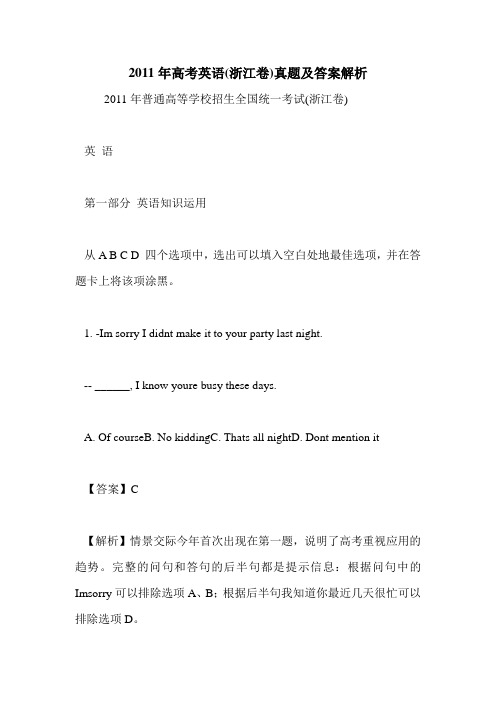
2011年高考英语(浙江卷)真题及答案解析2011年普通高等学校招生全国统一考试(浙江卷)英语第一部分英语知识运用从A B C D 四个选项中,选出可以填入空白处地最佳选项,并在答题卡上将该项涂黑。
1. -Im sorry I didnt make it to your party last night.-- ______, I know youre busy these days.A. Of courseB. No kiddingC. Thats all nightD. Dont mention it【答案】C【解析】情景交际今年首次出现在第一题,说明了高考重视应用的趋势。
完整的问句和答句的后半句都是提示信息:根据问句中的Imsorry 可以排除选项A、B;根据后半句我知道你最近几天很忙可以排除选项D。
2. Experts think that ______recently discovered painting may be ______ Picsso.A. the ;不填B. a ;theC. a; 不填D. the; a【答案】D【解析】本题考点为冠词,每年必考一题,常为区分某名词是特指还是泛指。
根据句意专家们认为这幅最近本发现的画作可能是一幅毕加索的作品。
可知前一空应该是表示特指的定冠词the;后一空用不定冠词a加上毕加索的名字,表示其众多作品之一,泛指。
3. Bats are surprisingly long lived creatures some ______a life span of around 20 years.A. havingB. hadC. haveD. to have【答案】A【解析】本题的考点为独立主格结构,判断依据是逗号前后主语不同,前者是所有蝙蝠,而后者是某些蝙蝠。
题干主句意为蝙蝠是一种长寿得令人吃惊的造物,主谓宾成分俱全,可以确定后面的部分为修饰性的补充说明型独立主格,相当于一个并列句,通常放在句末,主动关系,形式为:逻辑主语+现在分词=somehaving。
2011年全国高考英语试题及答案-浙江
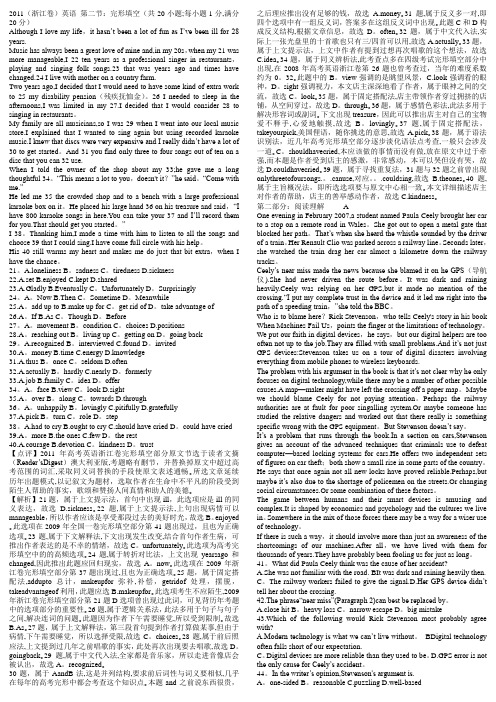
2011(浙江卷)英语第二节:完形填空(共20小题;每小题1分,满分20分)Although I love my life,it hasn’t been a lot of fun as I’ve been ill for 28 years.Music has always been a great love of mine and,in my 20s,when my 21 was more manageable,I 22 ten years as a professional singer in restaurants,playing and singing folk songs.23 that was years ago and times have changed.24 I live with mother on a country farm.Two years ago,I decided that I would need to have some kind of extra work to 25 my disability pension(残疾抚恤金)。
26 I needed to sleep in the afternoons,I was limited in my 27.I decided that I would consider 28 to singing in restaurants。
My family are all musicians,so I was 29 when I went into our local music store.I explained that I wanted to sing again but using recorded karaoke music.I knew that discs were very expensive and I really didn’t have a lot of 30 to get started。
2021年11月浙江高三英语真题(word版附答案)

2021年11月浙江高三英语真题(word版附答案)2021年下半年一般高等学校招生全国统一考试英语本试题卷分选择题和非选择题两部份。
全卷共12页,选择题部份1至9页,非选择题部份10至12页。
总分值150分,考试时刻120分钟。
考生注意:1.答题前,请务必将自己的姓名、准考证号用黑色笔迹的签字笔或钢笔别离填写在试题卷和答题纸规定的位置上。
2.答题时,请依照答题纸上“注意事项”的要求,在答题纸相应的位置上标准作答,在本试题卷上的作答一概无效。
选择题部份第一部份听力(共两节,总分值30分)做题时,先将答案标在试卷上。
录音内容终止后,你将有两分钟的时刻将试卷上的答案转涂到答题纸上。
第一节(共5小题;每题分,总分值分)听下面5段对话。
每段对话后有一个小题,从题中所给的A、B、C三个选项被选出最正确选项,并标在试卷的相应位置。
听完每段对话后,你都有10秒钟的时刻来回答有关小题和阅读下一小题。
每段对话仅读一遍。
does the woman want to do?TV.for a walk.the Internet.would the woman like to have a Chinese name?is taking a Chinese class.will be working in China.has made some Chinese friends.are the speakers talking about?travel plan.exam result.sports game.has the man been doing?something.his pen..does John suggest the woman do?his friend.Harry for help.to the airport with him.第二节(共15小题;每题分,总分值分)听下面5段对话或独白。
每段对话或独白后有几个小题,从题中所给的A、B、C三个选项被选出最正确选项,并标在试卷的相应位置。
(完整word版)2018年11月浙江高考英语试题与答案(含听力原文)

. . .2018 年下半年一般高等学校招生全国一致考试英语本试题卷分选择题和非选择题两部分。
全卷共12 页,选择题部分 1至9 页,非选择题部分 10 至 12 页。
满分 150 分,考试时间 120 分钟。
考生注意:1.答题前,请务势必自己的姓名、准考据号用黑色笔迹的署名笔或钢笔分别填写在试题卷和答题纸规定的地点上。
2.答题时,请依据答题纸上“注意事项”的要求,在答题纸相应的位置上规范作答,在本试题卷上的作答一律无效。
选择题部分第一部分听力(共两节,满分30 分)做题时,先将答案标在试卷上。
录音内容结束后,你将有两分钟的时间将试卷上的答案转涂到答题纸上。
第一节(共 5 小题;每题 1.5 分,满分 7.5 分)听下边 5 段对话。
每段对话后有一个小题,从题中所给的 A 、B、C三个选项中选出最正确选项,并标在试卷的相应地点。
听完每段对话后你都有 10 秒钟的时间往返答相关小题和阅读下一小题。
每段对话仅读一遍。
A.Watch TV.B.Go for a walk.C.Access the Internet.2.Why would the woman like to have a Chinese name?A.She is taking a Chinese class.B.She will be workingin China.C.She has made some Chinese friends.3.What are the speakers talking about?A.A travel plan.B.An exam result.C.A sports game.4.What has the man been doing?A.Writing something.B.Repairing his pen.C.Shopping.5.What does John suggest the woman do?A.Meet his friend.B.Ask Harry for help.C.Go to the airport with him.第二节(共 15 小题;每题 1.5 分,满分 22.5 分)听下边 5 段对话或独白。
2018年11月浙江高考英语真题(附答案)
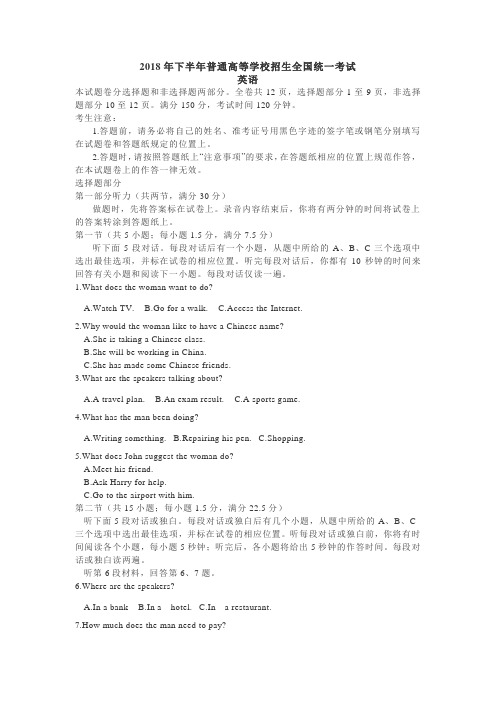
2018年下半年普通高等学校招生全国统一考试英语本试题卷分选择题和非选择题两部分。
全卷共12页,选择题部分1至9页,非选择题部分10至12页。
满分150分,考试时间120分钟。
考生注意:1.答题前,请务必将自己的姓名、准考证号用黑色字迹的签字笔或钢笔分别填写在试题卷和答题纸规定的位置上。
2.答题时,请按照答题纸上“注意事项”的要求,在答题纸相应的位置上规范作答,在本试题卷上的作答一律无效。
选择题部分第一部分听力(共两节,满分30分)做题时,先将答案标在试卷上。
录音内容结束后,你将有两分钟的时间将试卷上的答案转涂到答题纸上。
第一节(共5小题;每小题1.5分,满分7.5分)听下面5段对话。
每段对话后有一个小题,从题中所给的A、B、C三个选项中选出最佳选项,并标在试卷的相应位置。
听完每段对话后,你都有10秒钟的时间来回答有关小题和阅读下一小题。
每段对话仅读一遍。
1.What does the woman want to do?A.Watch TV.B.Go for a walk.C.Access the Internet.2.Why would the woman like to have a Chinese name?A.She is taking a Chinese class.B.She will be working in China.C.She has made some Chinese friends.3.What are the speakers talking about?A.A travel plan.B.An exam result.C.A sports game.4.What has the man been doing?A.Writing something.B.Repairing his pen.C.Shopping.5.What does John suggest the woman do?A.Meet his friend.B.Ask Harry for help.C.Go to the airport with him.第二节(共15小题;每小题1.5分,满分22.5分)听下面5段对话或独白。
2018年11月浙江省高考英语真题听力试题(附听力音频+答案+文本)
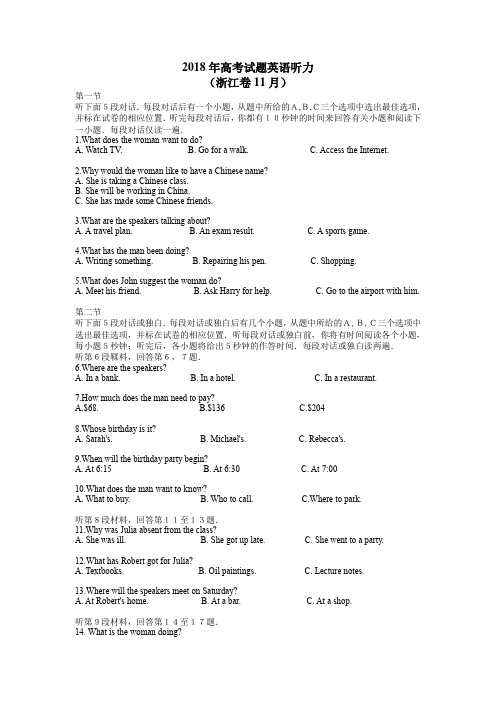
2018年高考试题英语听力(浙江卷11月)第一节听下面5段对话.每段对话后有一个小题,从题中所给的A,B,C三个选项中选出最佳选项,并标在试卷的相应位置.听完每段对话后,你都有10秒钟的时间来回答有关小题和阅读下一小题.每段对话仅读一遍.1.What does the woman want to do?A. Watch TV.B. Go for a walk.C. Access the Internet.2.Why would the woman like to have a Chinese name?A. She is taking a Chinese class.B. She will be working in China.C. She has made some Chinese friends.3.What are the speakers talking about?A. A travel plan.B. An exam result.C. A sports game.4.What has the man been doing?A. Writing something.B. Repairing his pen.C. Shopping.5.What does John suggest the woman do?A. Meet his friend.B. Ask Harry for help.C. Go to the airport with him.第二节听下面5段对话或独白.每段对话或独白后有几个小题,从题中所给的A,B,C三个选项中选出最佳选项,并标在试卷的相应位置.听每段对话或独白前,你将有时间阅读各个小题,每小题5秒钟;听完后,各小题将给出5秒钟的作答时间.每段对话或独白读两遍.听第6段鞣料,回答第6,7题.6.Where are the speakers?A. In a bank.B. In a hotel.C. In a restaurant.7.How much does the man need to pay?A.$68.B.$136C.$2048.Whose birthday is it?A. Sarah's.B. Michael's.C. Rebecca's.9.When will the birthday party begin?A. At 6:15B. At 6:30C. At 7:0010.What does the man want to know?A. What to buy.B. Who to call.C.Where to park.听第8段材料,回答第11至13题.11.Why was Julia absent from the class?A. She was ill.B. She got up late.C. She went to a party.12.What has Robert got for Julia?A. Textbooks.B. Oil paintings.C. Lecture notes.13.Where will the speakers meet on Saturday?A. At Robert's home.B. At a bar.C. At a shop.听第9段材料,回答第14至17题.14. What is the woman doing?A. Attending a seminar.B. Giving some advice.C. Doing an interview.15.How often does the man travel by bus?A. Twice a day.B. Every other day.C. Once a week.16.How does the mann feel about the bus service?A. It's good.B. It's fair.C. It's poor.17.What improvement should the bus company make?A. Buses should be more punctual.B. Drivers should be more polite.C. Seats should be more comfortable.听第10段材料,回答第18至20题.18. Who is Pierre?A. A doctor from Senegal.B. A university researcher.C. A United Nations official.19.What does Pierre mainly talk about?A. Food supplies in the world.B. The role that the UN plays.C. The purpose of his study.20.What is the expected outcome of Pierre's work?A. A new medicine.B. A new type of rice.C. A new farming method.自助获取听力音频答案:1-5 CBCAB6-10 BAACC11-15 ACBCA16-20 BABCB文本:Text 1W:The Internet is down again. Oh,what can I do?M:You can read a book,watch TV, take a walk...There are a lot of things to do.W:I don't mean that. I mean,how can I reconnect to it?down:停机的Text 2W:Brad, I've got this list of Chinese names here. Could you help me pick one?M:So, you're serious about having a Chinese name for your job in China?W:Yes.Two of my friends in the team have already got theirs.Text 3W:What's the score now?M:It's 3-2 at the moment in England's favor,but Spain seems to be taking the upper hand on the field.Text 4M:Oops!My pen is out of ink. I haven't finished yt.W:You can borrow mine.M:Thank you.I'll buy a new one tomorrow.Text 5W:John,could you give me a lift home this evening? My car is at the garage.M:I'd love to help you,but I promised to meet someone at the airport after work.Harry goes your way,though. Why don't you ask him?Text 6W:Good afternoon,Sir. Can I help you?M:Yes,we need a room for the night. Have you got any rooms available?W:Yes.Would you like a single room or a double room?M:A double room.W:How many nights would you like to stay?M:We're only staying overnight. We'll check out tomorrow morning. How much is it?W:It's $68 per night.M:OK. Do you accept credit cards?W:Yes,we do. Now,your room number is 204. Here is the key.M:Thank you.Text 7W:Michael,what time is it? We are going to be late for the party.M:It's 6:15. Don't worry, Rebecca.We will be fine.W:But we have to be at Sarah's house by 6:30 for her surprise birthday party. The traffic is getting heavier.M:Relax.The party starts at 7:00. We are not far from her house now.But I do need help with finding a place to park the car so Sarah doesn't see it. Can you phone her husband and ask him where it is best to park our car?W:OK.I'm calling him now.Text 8M:Hi Julia,it's Robert.How are you?I didn't see you in class today, and I wondered if you were all right.W:Oh yes.I'm better now.But I decided to take the day off, as I woke up with a slight cold.It's really so nice you called.M:Julia,I got you a copy of the main points of the lecture.It was just an introduction to French impressionist paintings.W:I see.I can read it then,before the next class.M:Uh,Julia...I'm calling as I wonder if you are free on Saturday night. My friend Max is having a party,and I'd like to know if you want to go.W:That would be really nice. I'll be free then. What time shall we go?M:How about meeting in the student union bar at seven o'clock?W: That'll be fine. But shouldn't we buy a present for Max?M:Well,we can stop at a gift shop on the way.W:Fine.I'll see you then.Text 9W:Excuse me.I'm doing research on bus service.Could I get you to answer a few questions?It won't take long.M:OK.I'd like to help.W:Thanks.How often do you take a bus --every day,lessl than once a week,or somewhere in between?M:I go to school by bus,so it's usually twice daily -- Line 4.W:I see.Could you rate its service?If one is poor,two is fair,and three is good, which number would you choose?M:I would say two.The drivers are nice,the buses are clean, and the seats are comfortable.But it's sometimes unreliable.There should be a bus every 10 minutes.But yesterday morning,I waited almost 20 minutes before the bus came and was almost late for school.W:Oh,that's too bad. Do you have some suggestions for the bus company?M:Try to have the buses arrive on time,of course.And,um...there can be a map on the bus. You know,some passengers cannot use the guidebook very well.W:Thank you very much for your help.M:You're welcomeText 10Hello,everyone.It is indeed a great pleasure to have this chance to address such a large audience this evening.I'm Pierre Chabreau(Marsay)from the University of Marseille (shublaw). At the moment,I'm carrying out research in Senegal for the United Nations, as part of a project to increase world food production. Before I get on to (开始谈论)what exactly we did in our research, I would like to explain briefly the purpose behind it. Quite simply,my subject is rice.As you all know,rice is the main food for millions of people in the world.So,if rice crops fail,millions of people starve and die.And they do fail,very often through disease.Now,what my colleagues and I have been doing out in the field in Senegal,as well as in the university laboratories,is to try to produce a disease-resisting variety of rice , a particular kind of rice which will resist disease, in other words,a stronger type of rice.。
2018年11月浙江英语高考卷真题及答案

2018年11月浙江省高考英语真题第一部分听力(共两节,满分30分)做题时,先将答案标在试卷上。
录音内容结束后,你将有两分钟的时间将试卷上的答案转涂到答题纸上。
第一节(共5小题;每小题 1.5分,满分7.5分)听下面5段对话。
每段对话后有一个小题,从题中所给的A、B、C 三个选项中选出最佳选项,并标在试卷的相应位置。
听完每段对话后,你都有10秒钟的时间来回答有关小题和阅读下一小题。
每段对话仅读一遍。
例: How much is the shirt?A. £19.15.B. £9.18.C. £9.15.答案是C。
1. What does the wo man want to do?A. Watch TV.B. Go for a walk.C. Access the Internet.2. Why wo uld the wo man like to have a Chinese name?A. She is tak ing a C hinese class.B. S he will be wo rk ing in China.C. She has made so me Chinese friend s.3. What are the speakers talk ing abo ut?A. A travel p lan.B. An exam result.C. A sports game.4. What has the man been do ing?A. Writing so mething.B. Rep airing his pen.C. Shopp ing.5. What does Jo hn suggest the wo man do?A. Meet his friend.B. Ask Harry for help.C. Go to the airport with him.第二节(共15小题;每小题 1.5分,满分22.5分)听下面5段对话或独白。
2018年11月浙江英语高考卷真题及答案
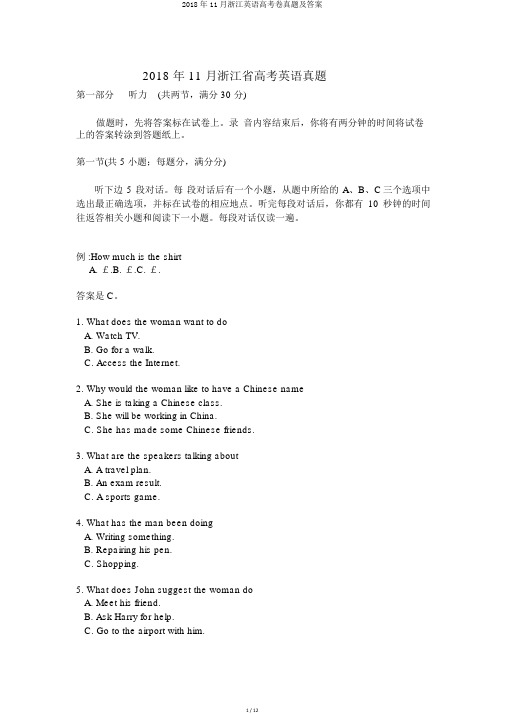
2018 年 11 月浙江省高考英语真题第一部分听力(共两节,满分 30 分)做题时,先将答案标在试卷上。
录音内容结束后,你将有两分钟的时间将试卷上的答案转涂到答题纸上。
第一节(共 5 小题;每题分,满分分)听下边 5 段对话。
每段对话后有一个小题,从题中所给的 A、B、C三个选项中选出最正确选项,并标在试卷的相应地点。
听完每段对话后,你都有10 秒钟的时间往返答相关小题和阅读下一小题。
每段对话仅读一遍。
例 :How much is the shirtA. £.B. £.C. £.答案是C。
1.What does the woman want to doA.Watch TV.B.Go for a walk.C.Access the Internet.2.Why would the woman like to have a Chinese nameA.She is taking a Chinese class.B.She will be working in China.C.She has made some Chinese friends.3.What are the speakers talking aboutA.A travel plan.B.An exam result.C.A sports game.4.What has the man been doingA.Writing something.B.Repairing his pen.C.Shopping.5.What does John suggest the woman doA.Meet his friend.B.Ask Harry for help.C.Go to the airport with him.第二节(共 15 小题;每题分,满分分)听下边 5 段对话或独白。
每段对话或独白后有几个小题,从题中所给的 A、B、C 三个选项中选出最正确选项,并标在试卷的相应地点。
- 1、下载文档前请自行甄别文档内容的完整性,平台不提供额外的编辑、内容补充、找答案等附加服务。
- 2、"仅部分预览"的文档,不可在线预览部分如存在完整性等问题,可反馈申请退款(可完整预览的文档不适用该条件!)。
- 3、如文档侵犯您的权益,请联系客服反馈,我们会尽快为您处理(人工客服工作时间:9:00-18:30)。
做题时,先将答案标在试卷上。
录音内容结束后,你将有两分钟的时间将试卷上的答案转涂到答题纸上。
第一节(共5小题;每小题分,满分分)听下面5段对话。
每段对话后有一个小题,从题中所给的A、B、C 三个选项中选出最佳选项,并标在试卷的相应位置。
听完每段对话后,你都有10秒钟的时间来回答有关小题和阅读下一小题。
每段对话仅读一遍。
例:How much is the shirt?A. £.B. £.C. £.答案是C。
1. What does the woman want to do?A. Watch TV.B. Go for a walk.C. Access the Internet.2. Why would the woman like to have a Chinese name?A. She is taking a Chinese class.B. She will be working in China.C. She has made some Chinese friends.3. What are the speakers talking about?A. A travel plan.B. An exam result.C. A sports game.4. What has the man been doing?A. Writing something.B. Repairing his pen.C. Shopping.5. What does John suggest the woman do?A. Meet his friend.B. Ask Harry for help.C. Go to the airport with him.第二节(共15小题;每小题分,满分分)听下面5段对话或独白。
每段对话或独白后有几个小题,从题中所给的A、B、C三个选项中选出最佳选项,并标在试卷的相应位置。
听每段对话或独白前,你将有时间阅读各个小题,每小题5秒钟;听完后,各小题将给出5秒钟的作答时间。
每段对话或独白读两遍。
听第6段材料,回答第6、7题。
6. Where are the speakers?A. In a bank.B. In a hotel.C. In a restaurant.7. How much does the man need to pay?A. $68.B. $136.C. $204.听第7段材料,回答第8至10题。
8. Whose birthday is it?A. Sarah’s.B. Michael’s.C. Rebecca’s.9. When will the birthday party begin?A. At 6:15.B. At 6:30.C. At 7:00.10. What does the man want to know?A. What to buy.B. Who to call.C. Where to park.听第8段材料,回答第11至13题。
11. Why was Julia absent from the class?A. She was ill.B. She got up late.C. She went to a party.12. What has Robert got for Julia?A. Textbooks.B. Oil paintings.C. Lecture notes.13. Where will the speakers meet on Saturday?A. At Robert’s home.B. At a bar.C. At a shop.听第9段材料,回答第14至17题。
14. What is the woman doing?A. Attending a seminar.B. Giving some advice.C. Doing an interview.15. How often does the man travel by bus?A. Twice a day.B. Every other day.C. Once a week.16. How does the man feel about the bus service?A. It’s good.B. It’s fair.C. It’s poor.17. What improvement should the bus company make?A. Buses should be more punctual.B. Drivers should be more polite.C. Seats should be more comfortable.听第10段材料,回答第18至20题。
18. Who is Pierre?A. A doctor from Senegal.B. A university researcher.C. A United Nations official.19. What does Pierre mainly talk about?A. Food supplies in the world.B. The role that the UN plays.C. The purpose of his study.20. What is the expected outcome of Pierre’s work?A. A new medicine.B. A new type of rice.C. A new farming method.答案速查1—5CBCAB 6—10BAACC11—15ACBCA 16—20BABCB第二部分阅读理解(共两节,满分35分)第一节(共10小题;每小题分,满分25分)阅读下列短文,从每题所给的A、B、C和D四个选项中,选出最佳选项,并在答题纸上将该项涂黑。
AThe most welcome sight on a cold, wet winter night in London is the familiar shape of a London taxi cab approaching with its yellow “for hire” sig n shining brightly. That shows it is ready to pick you up. Travelling by taxi in London is not just a way of going from one place to another. It is an experience to be enjoyed and remembered.The main reason for this is the drivers, who are called “cabbies.”Many of them are true Cockneys. This means they were born in the heart of London and speak their own special dialect (方言) of English. All of them know every street and famous building in the city, and all of them love to talk. A simple twenty-minute journey across town can become very interesting. You may have a discussion about the government and its leaders or a friendly talk about the driver’s Aunty Nellie! One thing is for sure, it will never be boring. Cabbies know all the latest news about film stars, the Royal Family, government leaders, and popular singers or actors and actresses.They also know the best places to eat, shop and relax. And they can take you straight to any large hotel, department store, theatre or museum. They know the shortest way possible without even looking at a map, because everyone who wants to become a taxi driver must pass a very difficult examination in order to get a license to drive a taxi. The exam is called “The Knowledge.” It is a written test, and in it drivers are asked the shortest way from one place to another. They must take into account the time of day — in rush hour, a longer route (路线) may be quicker—and describe the best way. Moreover they must never forget the one-way streets!21. From what can we tell that someone is a Cockney?A. Their interest.B. Their manners.C. Their speech.D. Their appearance.22. What does the author suggest by mentioning “Aunty Nellie”in paragraph 2?A. Passengers are full of curiosity.B. Cabbi es’ topics are wide-ranging.C. Aunty Nellie is popular in London.D. Londoners are friendly to each other.23. What is the purpose of “The Knowledge”?A. To qualify one to drive a taxi.B. To assess one’s driving skills.C. T o test drivers’ ability to write.D. To check taxi drivers’ memory.CBABThis month millions of American kids can forget about classroom bells and set off for grandparents’ homes, sleep-away camps and lifeguard stands. But summer vacation hasn’t always been a birthright of . schoolchildren. Before the Civil War, schools operated on one of two calendars (日历), neither of which included a summer vacation. Rural (农村的) schooling was divided into summer and winter terms, leaving kids free to help with the farm work in the spring planting and fall harvest seasons. Urban students, meanwhile, regularly had as many as 48 weeks of study a year, with one break per quarter.In the 1840s, however, educational reformers like Horace Mann moved to combine the two calendars out of concern that rural schooling was not enough and that overusing of young minds could lead to nervous disorders. Summer appeared as the obvious time for a break: it offered a rest for teachers, fit in the farming calendar and reduced doctor s’ concern that packing students into hot classrooms would promote the spread of disease.But people’s opinion about the modern . school year, which averages 180 days, is still divided. Some experts say its pleasant but lazy summer break, which took hold in the early 20th century, is one of the reasons math skills and graduation rates of . highschoolers ranked well below average in two international education reports published in 2007. Others insist that with children under increasing pressure to devote their downtime to internships (实习) or study, there’s still room for an institution that protects the lazy days of childhood.24. What did the rural school calendar before the Civil War allow children to do?A. Enjoy a summer vacation.B. Take a break each quarter.C. Have 48 weeks of study a year.D. Assist their parents with farm work.25. What did the educational reformers do in the 1840s?A. They introduced summer vacation.B. They shortened rural school terms.C. They promoted the study of farming.advocated higher pay for teachers.26. Why are some people unhappy about the modern . school year?A. It pushes the teachers too hard.B. It reduces the quality of education.C. It ignores science instruction.D. It includes no time for internships.DABCI start every summer with the best of intentions: to attack one big book from the past, a classic that I was supposed to have read when young and ambitious. Often the pairings of books and settings have been purely accidental: “Moby Dick”on a three-day cross-country train trip; “The Magic Mountain”in a New England beachside cottage with no locks on the doors, no telephones or televisions in the rooms, and little to do beyond row on the salt pond. Attempting “The Man Without Qualities” on a return to Hawaii, my native state, however, was less fruitful: I made it through one and a quarter volumes (册), then decided that I’d got the point and went swimming instead.But this summer I find m yself at a loss. I’m not quite interested in Balzac, say, or “Tristram Shandy.” There’s always “War and Peace,” which I’ve covered some distance several times, only to get bogged down in the “War” part, set it aside for a while, and realize that I have to start over from the beginning again, having forgotten everyone’s name and socialrank. How appealing to simply fall back on a favorite —once more into “The Waves” or “Justine,” which feels almost like cheating, too exciting and too much fun to properly be long in serious literature.And then there’s Stendhal’s “The Red and the Black,”which happens to be the name of my favorite cocktail (鸡尾酒) of the summer, created by Michael Cecconi at Savoy and Back Forty. It is easy to drink, and knocking back three or four seems like such a delightful idea. Cecconi’s theory: “I take whatever’s fresh at the greenmarket and turn it into liquid.” The result is a pure shot of afternoon in the park, making one feel cheerful and peaceful all at once, lying on uncut grass with eyes shut, sun beating through the lids...27. What can we infer about the author from the first paragraph?A. He has a cottage in New England.B. He shows talents for literature.C. He enjoys reading when traveling.D. He admires a lot of great writers.28. What do the underlined words “get bogged down” in paragraph2 mean?A. Get confused.B. Be carried away.C. Be interrupted.D. Make no progress.29. Why does the author say reading his favorite books feels like cheating?A. He finishes them quickly.B. He should read something serious.C. He barely understands them.D. He has read them many times before.30. What can be a suitable title for the text?A. The Books of SummerB. My Summer HolidaysC. To Read or Not to ReadD. It’s Never Too Late to ReadCDBA第二节(共5小题;每小题2分,满分I0分)根据短文内容,从短文后的选项中选出能填入空白处的最佳选项。
